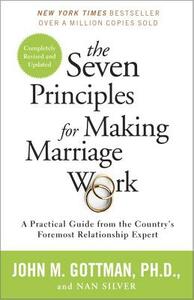Take a photo of a barcode or cover
Alright. Let's start with some background information. I am not married, but I am in a long term, committed relationship of several years. I'm a graduate student studying to become a mental health care provider, and I read this book for a course on marital/couples therapy. I therefore went into this book from the perspective of a therapist-in-training, but with my own relationship experiences in the wings to color my perspective. For this reason I know that I am NOT the target audience, and so I don't think it's fair for me to give an actual rating here. I will however share my thoughts.
Gottman presents a number of solid concepts that are worth taking to heart when building a healthy, functional, and sustainable partnership. That said, I took a lot of issue with the manner in which much of this information is presented. The man is clearly an expert in his field, and the amount of hard data he and his colleagues have amassed over decades of research is impressive. That said, we get very little of that data to bite into ourselves here. We get mentions of statistics and general overviews of some of his findings, but it's comparatively little and it's very much packaged and presented in support of his ideas, rather than giving us the data and then walking us through his logical inferences based on the findings. Presumably this data is all published somewhere in scholarly journals, formal research findings, etc. Why aren't we directed to any of that content, or given some basics to look through in an appendix? Instead the only suggestions for further reading we get are marketed toward the other books he's written which, again, are very much marketed as self-help style works rather an unfiltered sharing of research findings. I'm clearly coming at this from the perspective of a student who's used to working with textbooks, but I struggle with being told, "these are the facts, I am the expert, here's what you should do," without the benefit of the actual data those facts are being pulled from. (Seriously, just give me some tables with statistics and research findings in the back. Is that too much to ask?)
I also took issue with several instances in which Gottman does offer facts or statistics, but presents them and his extrapolated conclusions as proof of causation where acknowledging and discussing correlation would be much more appropriate, I think. That, and it feels like some data has been forced into a particular context to support his argument. Sure, the average couple works 1000 hours more per year today than they did 30 years ago. (Where did he get that statistic, by the way? See previous paragraph.) But are we taking into account the rise in two-income households in that same time span? Yes, I think that the 9-5 work day has expanded exponentially in recent years and of course that impacts our relationships. But that particular statistic has a lot more social context that needs to be considered before tossing it in to support the picture he's trying to paint.
Again, I acknowledge that I am not the target demographic here. I was reading this book as a mental and relationship health practitioner in training, rather than someone off the street who wants to know how to make my relationship succeed (though, let's be honest, who isn't open to picking up some ideas?). But Gottman very much couches himself as the end-all, be-all expert in this book, and I think that's a dangerous position to take when packaging his material the way that he does.
This isn't to say that I don't value the work and ideas presented here. Again, there are some excellent concepts here, and I'm absolutely sure that I'll implement some of his strategies and exercises with clients one day. But most likely I will boil the ideas down into their basic elements, and/or suggest specific page numbers or exercises to draw from without some of the questionable commentary. This book and it's elements are valuable tools for people in a committed partnership. But like everything, they should be taken with a grain of salt--and with clear understanding of Gottman's focus on self-marketing.
Gottman presents a number of solid concepts that are worth taking to heart when building a healthy, functional, and sustainable partnership. That said, I took a lot of issue with the manner in which much of this information is presented. The man is clearly an expert in his field, and the amount of hard data he and his colleagues have amassed over decades of research is impressive. That said, we get very little of that data to bite into ourselves here. We get mentions of statistics and general overviews of some of his findings, but it's comparatively little and it's very much packaged and presented in support of his ideas, rather than giving us the data and then walking us through his logical inferences based on the findings. Presumably this data is all published somewhere in scholarly journals, formal research findings, etc. Why aren't we directed to any of that content, or given some basics to look through in an appendix? Instead the only suggestions for further reading we get are marketed toward the other books he's written which, again, are very much marketed as self-help style works rather an unfiltered sharing of research findings. I'm clearly coming at this from the perspective of a student who's used to working with textbooks, but I struggle with being told, "these are the facts, I am the expert, here's what you should do," without the benefit of the actual data those facts are being pulled from. (Seriously, just give me some tables with statistics and research findings in the back. Is that too much to ask?)
I also took issue with several instances in which Gottman does offer facts or statistics, but presents them and his extrapolated conclusions as proof of causation where acknowledging and discussing correlation would be much more appropriate, I think. That, and it feels like some data has been forced into a particular context to support his argument. Sure, the average couple works 1000 hours more per year today than they did 30 years ago. (Where did he get that statistic, by the way? See previous paragraph.) But are we taking into account the rise in two-income households in that same time span? Yes, I think that the 9-5 work day has expanded exponentially in recent years and of course that impacts our relationships. But that particular statistic has a lot more social context that needs to be considered before tossing it in to support the picture he's trying to paint.
Again, I acknowledge that I am not the target demographic here. I was reading this book as a mental and relationship health practitioner in training, rather than someone off the street who wants to know how to make my relationship succeed (though, let's be honest, who isn't open to picking up some ideas?). But Gottman very much couches himself as the end-all, be-all expert in this book, and I think that's a dangerous position to take when packaging his material the way that he does.
This isn't to say that I don't value the work and ideas presented here. Again, there are some excellent concepts here, and I'm absolutely sure that I'll implement some of his strategies and exercises with clients one day. But most likely I will boil the ideas down into their basic elements, and/or suggest specific page numbers or exercises to draw from without some of the questionable commentary. This book and it's elements are valuable tools for people in a committed partnership. But like everything, they should be taken with a grain of salt--and with clear understanding of Gottman's focus on self-marketing.
challenging
hopeful
informative
fast-paced
medium-paced
This was a very good listen with some interesting advice. The only complaint relates specifically to the audiobook version. The book provides a variety of quizzes to assess relationships, and these quizzes do not transfer particularly well via audiobook.
I came for the psychology, half of these excersize are to do with your long term partner (obviously, so a lot of it is skipable. Heres an "exercize to do when child rearing"). So the four horseman metaphor has changed my life, I knew the bids for connection one, the solvable and unsolvable issue one LOL got the damn t-shirt. The main takeaway 'as long as there are fond memories in place there is always a chance of saving a relationship, even if it means professional intervention.'
informative
inspiring
reflective
fast-paced
challenging
informative
reflective
slow-paced
Super practical, hard to rate sort of book - the most beneficial portions are exercises that you conduct with your partner, operating more in the realm of a work book, so not really to be rated on the same criteria as your literary novels. This is a situation where you can get a lot out of it, but only if you are willing to take the time, be uncomfortable, and have a lot of dialogue with your partner about your relationship (#yougetoutwhatyouputin).
There are quite a few useful nuggets to chew on, that again can seem mundane/simple/obvious, but those are the things that fester, build toward resentment, they often seem small and insignificant in themselves but they can add up, compound and be symptomatic of something bigger. It's worth taking the time and making the effort to better understand what simple things might trip you up, how you and your partner respond during conflict and in turn be mindful of these things when they come up time and again, because they will.
There are quite a few useful nuggets to chew on, that again can seem mundane/simple/obvious, but those are the things that fester, build toward resentment, they often seem small and insignificant in themselves but they can add up, compound and be symptomatic of something bigger. It's worth taking the time and making the effort to better understand what simple things might trip you up, how you and your partner respond during conflict and in turn be mindful of these things when they come up time and again, because they will.
Once you understand this, you will be ready to accept one of the most surprising truths about marriage: Most marital arguments cannot be resolved. Couples spend year after year trying to change each other’s mind—but it can’t be done. This is because most of their disagreements are rooted in fundamental differences of lifestyle, personality, or values. By fighting over these differences, all they succeed in doing is wasting their time and harming their marriage.
While there things in this book that seem dated, super hetero-normative, there is much to be gleaned from the book if you can read passed those parts. My partner and I took our time with this and I suspect will return to certain sections from time to time, because a relationship does require continuous maintenance and this book provides some easy and interesting entry points to discussion.
informative
medium-paced
challenging
informative
reflective
medium-paced
Absolutely incredible book, and just about the only marital self help book one could ever need. Relationships can be so subjective and varied, so narrowing down the help provided to scientifically collected evidence is absolutely genius. Gottman is a master of relational psychology, to the point where I would consider this book essential reading for anyone who is married or who is thinking about marriage.





